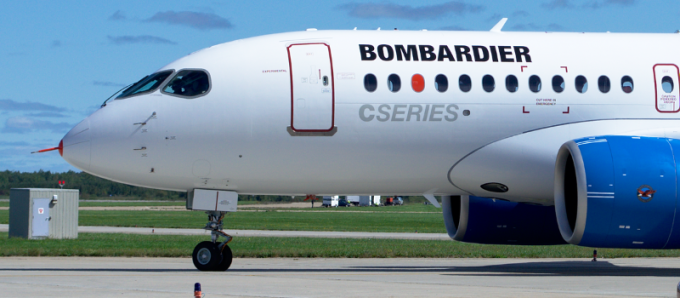On January 26, 2018, the International Trade Commission (ITC) ruled in favor of the Canadian plane maker Bombardier in a trade dispute initiated by U.S. rival Boeing. Both Bombardier and Delta Airlines immediately applaud the decision not to impose a 300% trade tax on Bombardier’s C Series jets imported to the United States. Boeing, however, remains “confident in the facts” of their case and claims it will continue to “defend” its belief.
The United States International Trade Commission ruled on January 26, 2018 that “a U.S. industry is not materially injured or threatened with material injury by reason of imports of 100- to 150-seat large civil aircraft from Canada that the U.S. Department of Commerce (Commerce) has determined are subsidized and sold at less than fair value”.
The decision, backed by ITC Chairman Rhonda K. Schmidtlein, Vice Chairman David S. Johanson, and Commissioners Irving A. Williamson and Meredith M. Broadbent’s votes, ultimately means that no antidumping or countervailing duty orders will be issued on Bombardier’s C Series jets.
Bombardier welcomed the ruling, calling it a “victory for innovation, competition, and the rule of law”. The company released a statement claiming that the ITC’s determination is “beneficial for U.S. airlines and the U.S. traveling public”, pointing out not only to technical aspects of the C Series jets, but also to the fact that its development and production “represent thousands of jobs in the United States, Canada, and the United Kingdom”.
“With this matter behind us, we are moving full speed ahead with finalizing our partnership with Airbus,” is claimed in the statement by Bombardier. “Integration planning is going well and we look forward to delivering the C Series to the U.S. market so that U.S. airlines and the U.S. flying public can enjoy the many benefits of this remarkable aircraft”.
The U.S. carrier Delta Airlines is also “pleased” with the ruling. The airline released a statement in which it points out that Boeing does not offer a “viable alternative” to Bombardier’s 110-seat CS100 aircraft. Delta is now looking forward to “introducing the innovative CS100 to its fleet for the benefit of Delta’s employees, customers and shareowners”.
Boeing, on another hand, was less than impressed by the ITC’s rejection of its claim. Boeing claims to be “disappointed that the International Trade Commission did not recognize the harm that Boeing has suffered from the billions of dollars in illegal government subsidies that the Department of Commerce found Bombardier received and used to dump aircraft in the U.S. small single-aisle airplane market”.
“Those violations have harmed the U.S. aerospace industry, and we are feeling the effects of those unfair business practices in the market every day”, the company noted in a statement, where it also makes a hint that the dispute might not be over just yet. “Boeing remains confident in the facts of our case and will continue to document any harm to Boeing and our extensive U.S. supply chain that results from illegal subsidies and dumped pricing. We will not stand by as Bombardier’s illegal business practices continue to harm American workers and the aerospace industry they support. Global trade only works if everyone adheres to the rules we have all agreed to. That’s a belief we will continue to defend”.
Boeing launched a trade dispute against Bombardier in 2017, alleging that the Canadian government is illegally subsidizing C Series commercial airliner program and that the planes are being sold in the U.S. at “absurdly low” prices.
Boeing backed this claim by referring to Delta Airlines and Bombardier deal for C Series planes. At the end of 2016, Delta Airlines canceled a deal with Boeing for the purchase of 18 Boeing 787-8 Dreamliners. The amount of the canceled transaction is estimated at $4 billion. At the same time, in April 2016, Delta Airlines entered into an agreement with Bombardier to purchase 75 CS100 aircraft valued at $5.6 billion.
Following the accusations, the U.S. government imposed 300% trade duties on C Series planes, but the ITC ruling now determines that the tax obligation will not come into force.
Source – AeroTime


